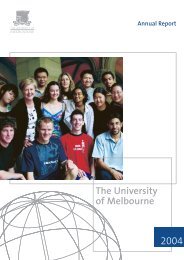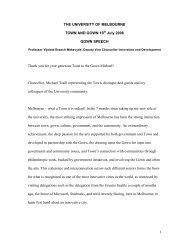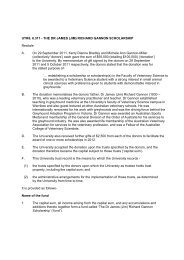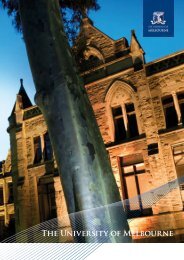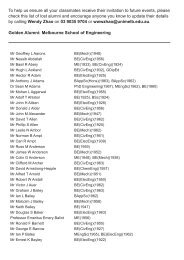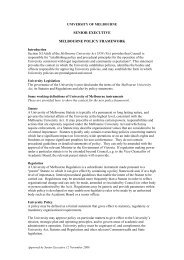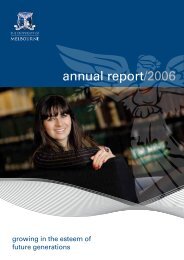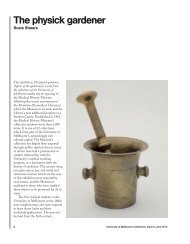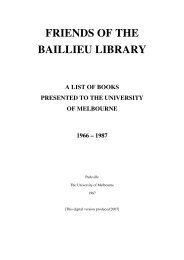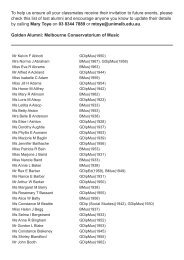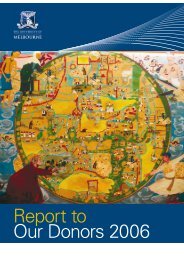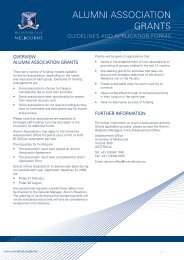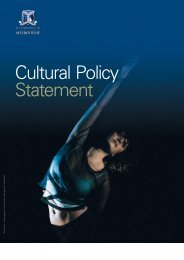2010 International Undergraduate Prospectus nts. u.au
2010 International Undergraduate Prospectus nts. u.au
2010 International Undergraduate Prospectus nts. u.au
You also want an ePaper? Increase the reach of your titles
YUMPU automatically turns print PDFs into web optimized ePapers that Google loves.
Doctor of Optometry Q<br />
Q Pending Academic Board approval.<br />
Duration and campus<br />
4 years full-time<br />
Parkville campus and various national<br />
and international clinical venues<br />
Entry requireme<strong>nts</strong><br />
A three-year undergraduate degree<br />
with a completion of Physics or Optics<br />
subjects (any level); and an Anatomy or<br />
Cell Biology subject (second- or thirdyear<br />
level); and two other subjects from<br />
the molecular, cellular or physiological<br />
sciences (second- or third-year level).<br />
The University of Melbourne’s<br />
Bachelor of Science or the Bachelor of<br />
Biomedicine are ideal pathways to this<br />
graduate program.<br />
Extra requireme<strong>nts</strong><br />
Graduate Australian Medical School<br />
Admission Test (GAMSAT) or the<br />
Optometry Admission Test (OT), a<br />
personal statement including details on<br />
any relevant work experience, referee<br />
reports and/or attend an interview.<br />
Selection criteria<br />
Selection will be based on applica<strong>nts</strong>’<br />
academic record – GPA for the last<br />
two years of a completed Australian<br />
bachelors degree (or equivalent), with<br />
double weighting on the final year as well<br />
as the above extra requireme<strong>nts</strong>.<br />
More information<br />
Melbourne Graduate School of<br />
Science<br />
t + 61 3 8344 6404<br />
f + 61 3 8344 5803<br />
e http://www.science.unimelb.edu.<strong>au</strong>/<br />
contact<br />
w http://graduate.science.unimelb.edu.<strong>au</strong><br />
Course description<br />
The course will begin with an integrated<br />
biological and biophysics program<br />
including visual optics, which leads to the<br />
understanding of fundamental aspects of<br />
ocular function in health and disease and<br />
the ability to manage ocular defects. Early<br />
clinical experience will be a feature of the<br />
program and will build, in a structured way,<br />
communication and clinical reasoning skills.<br />
The later years of the course will consolidate<br />
bioscience knowledge to promote<br />
advanced clinical skills with a strong<br />
emphasis on evidence-based practice.<br />
Broad clinical experience will be achieved<br />
by providing an unparalleled range of<br />
rural and metropolitan placeme<strong>nts</strong> and<br />
international externship opportunities.<br />
Fields of study: Anatomy, biochemistry,<br />
pathology, pharmacology, physiology, and<br />
microbiology/immunology, diseases of the<br />
eye, optics, ophthalmic optics and contact<br />
lenses, primary care optometry, therapeutic<br />
management of ocular disease, vision<br />
and perception, paediatric vision, geriatric<br />
vision, vision impairment.<br />
Creating a world of career<br />
opportunities<br />
Most graduates initially choose to work in<br />
an established practice, and many will go<br />
on to own and operate their own practices.<br />
Graduates who choose to pursue a higher<br />
degree in research in an area of clinical<br />
optometry or the vision sciences may<br />
go on to a career in academia, training<br />
the next generation of optometrists and<br />
research scientists. Others take up roles<br />
in industry contributing to the research<br />
and development of therapies, visual<br />
aids or diagnostic instrume<strong>nts</strong> to support<br />
optometry practice. Graduates who enter<br />
a career in the optometric industry may<br />
be employed in a range of roles within<br />
companies who market and supply<br />
goods and services to the optometry<br />
profession. Many of these companies are<br />
global and operate in areas as diverse<br />
as: software development; spectacle or<br />
contact lens manufacture and supply;<br />
frame manufacture, import and supply; and<br />
associated sales and marketing.<br />
Professional and international<br />
degree recognition<br />
Our Doctor of Optometry will be accredited<br />
by the Optometry Council of Australia and<br />
New Zealand (OCANZ) allowing graduates<br />
to register for full scope optometry<br />
practice in all Australasian jurisdictions.<br />
Accreditation with the Accreditation Council<br />
on Optometric Education (ACOE) which<br />
accredits all optometric degree (O.D.)<br />
programs in the United States and Canada<br />
is also planned.<br />
Graduates are also able to apply for<br />
recognition of their qualification and<br />
registration in several Asian and European<br />
countries (e.g. Singapore, Malaysia,<br />
Norway, and United Kingdom). Further<br />
information on specific requireme<strong>nts</strong> for<br />
licensure should be obtained from the<br />
respective bodies in each country and state<br />
or province.<br />
Doctor of Physiotherapy<br />
(from 2011)<br />
Duration and campus<br />
3 years full-time<br />
Parkville campus and hospital clinical<br />
schools (includes rural locations)<br />
Entry requireme<strong>nts</strong><br />
An undergraduate degree in biosciences<br />
with a completion of second-year<br />
anatomy and physiology subjects.<br />
The University of Melbourne’s Bachelor<br />
of Biomedicine and the Bachelor of<br />
Science are ideal pathways to this<br />
graduate program.<br />
Extra requireme<strong>nts</strong><br />
Graduate Australian Medical School<br />
Admission Test (GAMSAT); or Medical<br />
College Admission Test (MCAT); and a<br />
structured interview.<br />
Selection criteria<br />
Selection will be based on undergraduate<br />
academic records – the grade point<br />
average (GPA) from a completed three<br />
(or more) year university degree and the<br />
above extra requireme<strong>nts</strong>.<br />
More information<br />
School of Physiotherapy<br />
t +61 3 8344 9400<br />
f +61 3 9347 4375<br />
e physiotherapy-enquiries@unimelb.<br />
edu.<strong>au</strong><br />
w www.physioth.unimelb.edu.<strong>au</strong><br />
Course description<br />
The Doctor of Physiotherapy combines<br />
theoretical and practical skills necessary<br />
to assess and treat disorders of human<br />
movement. The new three-year graduate<br />
program in Physiotherapy will focus on<br />
developing advanced skills in three core<br />
areas: clinical practice, research and<br />
leadership. As a professional entry level<br />
program, the Doctor of Physiotherapy<br />
will build on existing prior knowledge<br />
of biosciences. The course will include<br />
integrated theory and evidence-based<br />
clinical practice in prestigious teaching<br />
hospitals. Clinical communication,<br />
reasoning skills and practice will<br />
commence in the first year of the course.<br />
Stude<strong>nts</strong> will be exposed to a broad range<br />
of clinical experiences. Theoretical and<br />
clinical skills will be consolidated in the<br />
final years of the course. The fields of study<br />
are anatomy, physiology, biochemistry,<br />
pharmacology, pathology, women’s<br />
health, paediatrics, geriatrics, rural<br />
physiotherapy, musculoskeletal, neurology,<br />
cardiorespiratory.<br />
91




